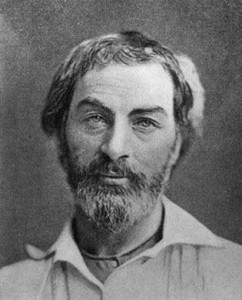

I fell in love with the poems of Walt Whitman in high school, and to this day I still have my worn-out copy of his poetry collection, Leaves of Grass, peppered with bookmarks of my favorite pieces. One of these is “Song of Myself,” a long poem that is divided into 52 sections. Not all of these sections ruminate on death, but a few of them do, and number “6” in particular. In it, a little boy asks Whitman what grass is, and this leads the poet to connect it to the life cycle and death.
In one of his answers Whitman says that the grass is perhaps a form of life: “Or I guess the grass is itself a child, the produced babe of vegetation.” The vegetation gave birth to the grass, just as a mother to a child, and it is itself a living thing. Next he states that it could be a symbol of uniformity: “Or I guess it is a uniform hieroglyphic,/And it means, Sprouting alike in broad zones and narrow zones,/Growing among black folks as among white…” Here Whitman connects the universality of grass to the universality of death, and how it is something that happens to all of us, to people of all races and all locations.
And then finally, Whitman makes the metaphor of the grass as a facet of death: “And now it seems to me the beautiful uncut hair of graves.” Whitman uses the word “beautiful” to show that he is not opposed to death. And his metaphor shows that life comes out of death; and thus, it is a cycle. Whitman then goes on to ask, and then answer, questions about those that have died: “What do you think has become of the young and old men?/And what do you think has become of the women and children?” Here, he poses a question, but does not wait for a reply. Instead, he continues:
They are alive and well somewhere,
The smallest sprout shows there is really no death,
And if ever there was it led forward life, and does not wait at the
end to arrest it,
And ceas’d the moment life appear’d.

Whitman’s confidence in immediately answering his own question, and also making bold statements such as “there is really no death” embodies his absolute honesty and belief in what he says. He is not doubtful or hesitant in the slightest. By saying “they are alive and well somewhere” and “it led forward life,” Whitman asserts that death is not an end to life, but merely a slight pause, after which life continues, rather than abruptly ending. Death does not “arrest” life; it allows it to continue on.
In the next line, Whitman is even more audacious: “All goes onward and outward, nothing collapses,/And to die is different from what any one supposed, and luckier.” By saying “nothing collapses,” he avows that nothing is made worse; if anything, it is made better, since “all goes onward and outward”- everything continues, and expands, or improves. Whitman is also sure to put the classic view of death to rest, in saying “to die is different from what any one supposed.” In his opinion, death is better than the way most perceive it, and even “luckier.”
In the opening of the next section, Whitman persists with his strong opinions. He says, “Has any one supposed it lucky to be born?/I hasten to inform him or her it is just as lucky to die, and I know it.” It is common for people to believe that they are lucky to have been born, but Whitman flips this around and applies the statement to death. Again, he is completely secure in his view, which he shows by stating unapologetically, “I know it.” He later expounds on this: “I am the mate and companion of people, all just as immortal and/fathomless as myself,/(They do not know how immortal, but I know.)” Whitman doesn’t try to set himself apart, or claim that he is the sole possessor of this immortality. Rather, he makes sure that everyone knows that they are “all” as “immortal” and “fathomless.” Once again, Whitman makes one of his clear-cut remarks by stating, “but I know.” Even if others doubt their immortality, Whitman knows it exists.
Amidst the abundance of literature in the world that makes subtle allusions to death, or speaks of it in symbolic terms, it’s refreshing to see a writer so open and bold in his opinion about it. We live in a society where often people are afraid to state their opinions outright, and especially on such uncertain subjects as death. But Walt Whitman is unyielding in his view, and this sort of confidence is one we should all aspire to; particularly considering that, according to Whitman, death is merely another point in the journey of life.

 “Song of Myself” by Walt Whitman
“Song of Myself” by Walt Whitman


 National Donate Life Month Reminds Us To Give
National Donate Life Month Reminds Us To Give
 How Dare You Die Now!
How Dare You Die Now!
 Debating Medical Aid in Dying
Debating Medical Aid in Dying














